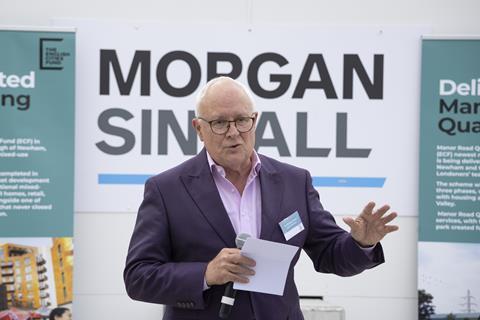The one-time New Labour fixer tells Joey Gardiner about his plans to expand the English Cities Fund, the ‘shameful’ state of English planning - and what the next government needs to do to get more homes built

When the predecessor to Homes England approached Sir Michael Lyons back in 2002 to chair a new kind of public-private joint venture development vehicle it was looking to set up – a fruit of the then still fresh Urban Task Force report – he was not expecting the job offer to hit him quite so close to home.
English Partnerships, as it was then known, tried to tempt him to join the English Cities Fund by bringing along early plans for the redevelopment of Canning Town’s Rathbone Market in Newham, east London, he says. Little did they know that Lyons, who had earned his reputation and his knighthood running a series of Midlands local authorities, was actually a former East End boy, who grew up postwar in London’s Royal Docks.
“I said to them: ‘I bet I know this area better than any of you do,’ and it turned out that was true in spades. Because this was the market I used to carry potatoes around for my mum.
“Every Friday, 12lb of Kings Edwards to what was then Cundy Road, where the Excel centre is now,” he laughs. “It was good training.”
Needless to say, he took the job. Twenty-one years later, not only is Lyons still at the helm of the English Cities Fund (ECF), but the venture is about to launch its second major scheme in Canning Town – having completed the initial Rathbone Market project years’ since.

The ECF, a joint venture partnership between Homes England, L&G and Morgan Sindall-owned regeneration developer Muse, last year got sign-off to push ahead with building out a 6,500-home development pipeline in the kind of places that other developers fear to tread. Now, Lyons reveals, it is ready to go even further.
But Lyons, of course, is not just chair of the fund. His background as a once-ubiquitous New Labour “fixer” in the noughties means that, with Labour attracting business interest ahead of a wide-open general election next year, his take on housing policy is likely to be highly influential.
In an interview conducted as part of the Building the Future Commission – a year-long project run by Housing Today sister publication Building looking at radical ideas to transform the built environment – he tells Housing Today both what the ECF is planning, and what he thinks Labour, and the industry, should do next to solve the housing crisis.
Survivors
Rather like the ECF itself, Lyons could be regarded as something of a survivor. There was a period in the early 2000s when it seemed there wasn’t a thorny problem of public administration that he could not be drafted in to solve.
Following his departure from Birmingham council in 2001, he was made deputy chair of the Audit Commission, and chaired reviews into public sector relocation and, then more substantially, into the role and function of local government as a whole. In 2007 he was even made chair of the BBC.
Lyons says Newham ended up benefitting to the tune of £15m by putting the land in on a joint venture basis
But the era of austerity presaged by the election of the coalition government in 2010 heralded both swingeing cuts to the level of government funding for the kind of regeneration initiatives that the ECF had been set up to support, as well as lean times for public figures like Lyons closely linked to the previous administration.
This is despite the fact that Lyons – both a polite and affable character, and highly respected operator – was only briefly a “political” figure, as a Labour councillor in the early 1980s.
He says there was even a risk that the coalition could have shut the ECF, but that those discussions were “weathered” by the fund. “Actually, JVs and urban regeneration for a period after the new Cameron coalition came in weren’t really flavour of the day,” he says.
“But we were able to demonstrate at that time that we could pay back absolutely everything that had been invested in the fund – and a return on it. And I think we were one of the few [public-private partnership] JVs to survive that period.”
With government roles drying up, Lyons himself was commissioned by Labour’s Ed Miliband in 2013 to carry out a review of housing policy for the party, which shaped policy ahead of the 2015 election.
“I think we will go beyond 6,500 homes. We’re absolutely confident of the support we’ve got.”
Beyond that, Lyons, despite now being in his 70s, has kept working, including briefly chairing for-profit social landlord Sage. The last year has seen him undertake an independent review of Invest Northern Ireland for the Stormont assembly and chair the Belfast Innovation and Inclusive Growth Commission. At the same time the ECF seems to have stirred itself from its austerity-induced slumber.
Evangelist
Lyons is evangelical about the body, which was set up as a partnership between the public and private sectors in order to invest in redeveloping those places where private sector developers would not be able to get schemes off the ground. While he says it works on a commercial basis, and does not receive “soft” money from Homes England that would not be available to any other developer, he claims its genius is in being able to generate the confidence of public sector landowner partners by taking a long-term view.
“Partly, it’s how long we commit ourselves to working in that area,” he says. “That has been a hallmark. People know you are going to be around to finish the development that you’re involved in.”

Newham is a prime example of this, with the 650-home, three-phase Rathbone Market scheme conceived as a key project from the outset. Newham initially wanted to sell the site to the ECF, hoping to get around £2.4m.
Lyons says the ECF persuaded the council that, not only would this up-front cost make the scheme unviable, it would also vastly diminish Newham’s ultimate return.
“We said, ‘it just won’t work, you’ve got to put your land in as equity, and you’ll get your share [of profit] with us’,” he says. In the event, Newham ended up benefitting to the tune of £15m by putting the land in on a joint venture basis. This was well over four times what the council would have got from a sale – on top of the homes delivered by the scheme.
Lyons is adamant too that the public-private partnership model, devised in the Office of the Deputy Prime Minister under John Prescott, has not had its day. “It’s absolutely still relevant. We have a lot of inquiries [from local authorities]. And that’s in part because they have seen we do quality work.”
Bullish
He is bullish, too, about what is next for the ECF. It is a fund, structured as a limited partnership, with the partners providing half of its money – which is effectively working capital to bankroll its development activity – and the rest supplied by bank lending.
In 2018 the £100m fund doubled in size to £200m, thereby theoretically doubling its development capacity, and last year the partners recommitted to its future, extending its life by 10 years to at least 2036 with a promise to build at least 6,500 new homes.
Lyons says that it has generated development with gross development value of around £1bn so far, with 2,000 homes built or under construction. Schemes committed to would take this to £1.8bn GDV.

But now he wants to go further than the promised 6,500 figure. This means not just building out existing schemes in Canning Town, St Helens and Salford – where it is about to start on the 3,000-home Salford Crescent phase of its development – but also signing prospective deals in (he says) four other places, including a partnership with Wolverhampton Council.
“Oh I think we will go beyond it [the 6,500]”, he says. “We’re absolutely confident of the support we have got from Homes England at the highest level and throughout the organisation.”
Does this mean expanding the organisation’s funding again, up from the current £200m level? “[Yes], as soon as we need it”, he says, though he does not set a specific timeframe.
“If we now expand the areas we are working in, as we have done in Salford and St. Helens and we will do in Wolverhampton and the other three [pipeline deals], then you need to expand your working capital to be able to do that.”
Currently top of Lyons’ ECF in-tray, however, is overseeing the build-out of its latest scheme to come forward, the sequel to the Rathbone Market project in Canning Town, situated just the other side of the various rail and road overpasses from the original scheme, underlining the tough urban nature of the 885-home Manor Road site.
Lyons says the current sluggish post-mini Budget market “inevitably could” mean delays to the project, for which a commercial launch is planned on the 355-home first phase in June.

However, no decision has so far been taken to change phasing for the scheme – with any alteration likely to be dependent on the success, or otherwise, of next months’ commercial launch – and Lyons says the ECF will seek to avoid any delay if possible.
“It hasn’t been our style so far. By and large we’ve taken market variations on the chin, believing that actually we are a different type of developer,” he says.
Shameful
Lyons’ housing review conducted for former Miliband argued for planning and land market reforms, and greater powers for local authorities to drive supply. He was criticised by countryside campaigners for supporting a right to grow for urban authorities as pointedly it did not rule out reviews of green belt designations.
Given that stance, it is no surprise that his assessment today of the state of the Conservative party’s planning policies is withering – though he is very clear he is making these points not in his capacity as ECF chair, but rather as author of the Lyons Review.
“We were very clear about the importance of keeping up the pressure on every single council to complete its development plan in its area,” he says. But the government appears to have chosen to lift that pressure in the last few months via the latest consultation on planning policy changes.
“As soon as you then say, ‘actually, you don’t really need to set those targets seriously anymore’, then there is no need to do the difficult and thorny job of saying to a local village or local suburb, ‘you’ve got to have so many homes, and you can work out where they’re going to be’,” he says.
“You just can’t have some [communities] say, ‘no, we don’t want any.’ Because that just ripples back up the system. It would be extremely regrettable if the pressure was kept off.”
Referring to the near-50 local authorities reported to have paused or delayed plan-making efforts in the past year since Michael Gove changed course on planning reform, Lyons is unequivocal. “It’s shameful that you have got that proportion of councils not finishing their development plans and believing that there are going to be no sanctions. And absolutely believing rightly [that there will be no sanctions].”
Tough message
But, if he is critical of the Tories, he also has a tough message for Labour, given it has just launched a new housing policy based on a target of boosting UK home ownership levels to 70% (Lyons was interviewed before this target was published).
“It’s shameful that you’ve got that proportion of councils not finishing their development plans and believing that there are going to be no sanctions”
“You are not going to solve the housing crisis in this country by telling everybody they have a right to expect homeownership,” he states. “It just is not possible.
“That is a difficult message to give out but, on the other hand, it [home ownership] is getting in the way of really dealing with providing proper secure housing for a very large part of the population.
“I have a bit of regret my work didn’t focus as strongly as it should have done on affordable rented property.
“This is a very important lesson: you are not ever going to build enough homes for everyone to own their own homes in this country, and there is not really enough political honesty about the fact you are not going to meet that aspiration. So, you need to expand homes for rent.”

Perhaps this message is the reason that, somewhat surprisingly, Lyons says he has not been in talks with the current Labour front bench while they have been drawing up their housing and planning policy package.
>>Also read: ‘We’re victims of short-term policy-making’: Interview with Taylor Wimpey boss Jennie Daly
>> Both sides in Tory battle over housing and planning have a point – and both are wrong
The limited details released so far – which talk about ensuring authorities meet housing need, and a desire to change the development model – suggests his report at least has been consulted, if not the author himself.
He says he would be happy to help Labour if approached, but downplays the idea of some new big role if the party is elected. “I’m too old for these things,” he smiles.
But do not mistake that for thinking that Lyons does not having radical ideas. He is adamant that the government cannot tackle the housing crisis without abolishing the Right to Buy – “an absolute blight on affordable housing” – and empowering local authorities to – surprise, surprise – work alongside the private sector to tackle the crisis.
“Yeah, it’s that word ‘partnership’. I mean, councils have got the land. They have got the obligation. They have got some great exemplars,” he says, citing their ability to deliver – as in Barking and Dagenham – via local housing companies.
But he cautions against any return to a more old-Labour mindset. “What they really cannot do is return to the days when they did it [housebuilding] themselves. They had a direct housing department. That’s absolutely gone now.”
Lyons has spent the past decade influencing rather than controlling events in the public sector. Depending on the outcome of the next election, he – and the English Cities Fund – could become a whole lot more influential in about 18 months’ time.
The Building the Future Commission

The Building the Future Commission is a year-long project, marking Building’s 180th anniversary, to assess potential solutions and radical new ways of thinking to improve the built environment.
The major project’s work will be guided by a panel of 19 major figures who have signed up to help shape the commission’s work culminating in a report published at the end of the year.
The commissioners include figures from the world of contracting, housing development, architecture, policy-making, skills, design, place-making, infrastructure, consultancy and legal. See the full list here.
The project is looking at proposals for change in eight areas:
- Education and skills
- Housing and planning
- Energy and net zero
- Infrastructure
- Building safety
- Project delivery and digital
- Workplace culture and leadership
- Creating communities
>> Editor’s view: And now for something completely positive - our Building the Future Commission
>> Click here for more about the project and the commissioners
Building the Future is also undertaking a countrywide tour of roundtable discussions with experts around the regions as part of a consultation programme in partnership with the regional arms of industry body Constructing Excellence. There is also a young person’s advisory panel.
We are inviting readers to submit ideas for how to improve the built environment through our online form which will form part of our Ideas Hub.



























No comments yet